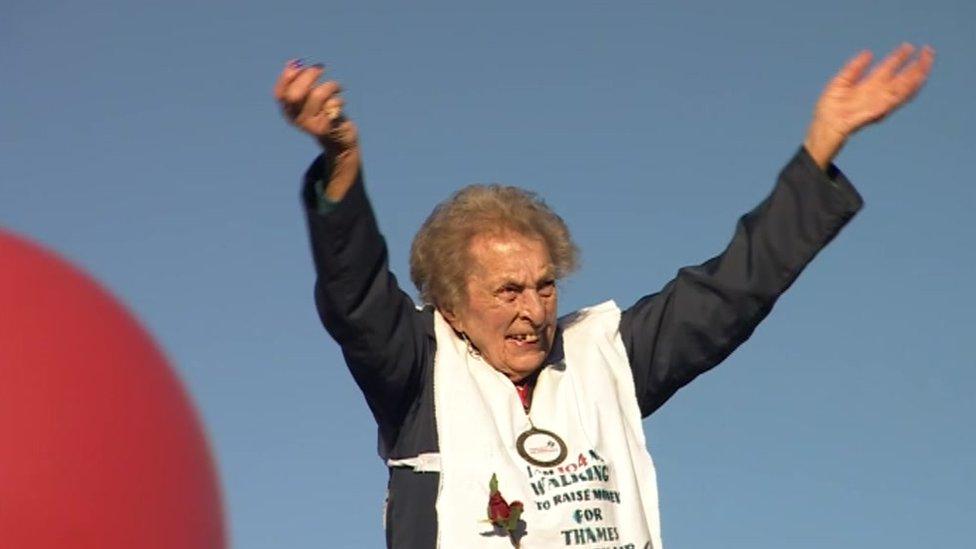Covid: Small charities face 'slow death'
- Published
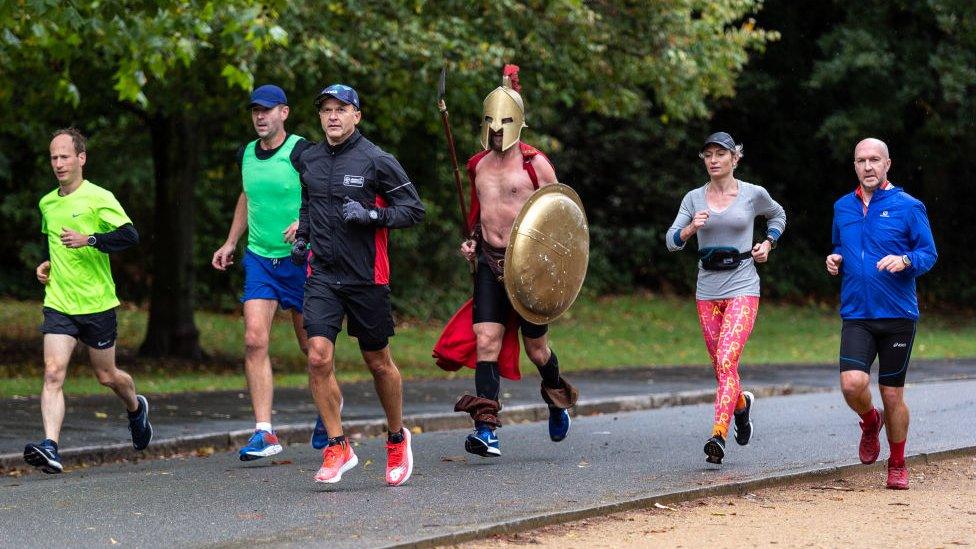
Runners take part in the Virtual London Marathon in Dulwich Park, south London on 4 October
Thousands of smaller charities across the UK could cease to exist in the new year, experts fear, following a shift in the nature of giving.
Fundraising data and recent polls have shown a surge in donations to new NHS charities since March.
Causes such as animal shelters, disability support groups and homeless shelters have, however, seen a fall.
The government issued a £750m bailout to the sector in April but there are now growing calls for more support.
Why are smaller charities struggling?
A new report by the Charities Aid Foundation (CAF) said overall giving in the UK had increased by £800m in 2020, compared to the previous year.
But it says that increase has not been felt by a swathe of the 110,000 smaller charities in the UK, many of which would normally rely on events such as abseils, skydives, village fetes and quiz nights to top up their funds.
BBC analysis shows almost eight out of ten charities have an income of less than £100,000 a year and account for just 3% of the total income.
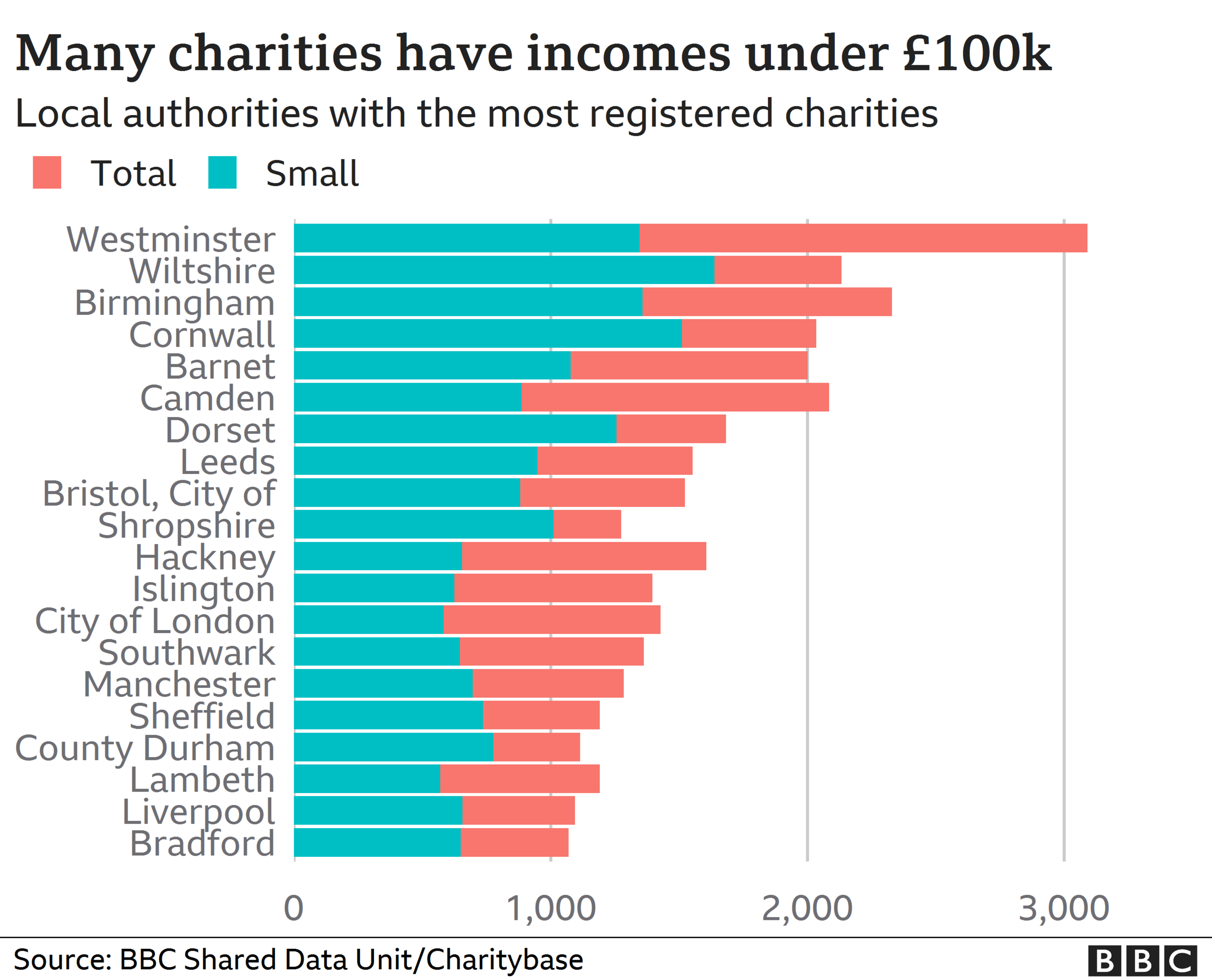
The foundation's chief executive Neil Heslop said the "Protect the NHS" slogan and support for Captain Tom Moore's bid to walk 100 laps around his garden in April for NHS Charities Together had led to an outpouring of support for causes considered on the the frontline of the pandemic.
But he said other causes were being left at risk as a result.
"NHS charities and hospitals themselves have seen a huge upsurge in support and that's been wonderful to see," he said.
"The challenge has really been for many other charities, especially the smaller ones that do not have much by way of reserves, that saw their normal fundraising drives completely shut down."
Polling by YouGov suggests animal shelters have seen the biggest year-on-year decline in donations.
A Yorkshire cat sanctuary said the pandemic's impact had put it "back a decade".
Two of the biggest fundraising sites in the UK have also reported a similar trend.
Between March and August, JustGiving saw donations to charities concerning education and disability drop by 46%.

Mr Heslop says the pandemic has changed the sector drastically
At Virgin Money Giving, sponsorship of charities formed before 2020 was down £25m compared to the previous year.
BBC analysis of a sample of more than 1,600 fundraising pages on the site showed the average amount raised on each page dropped from a high of £657 a month in February to a low of £236 in June.
Jo Barnett, its executive director, said: "Lots of organisations have adapted and moved those large-scale events into the virtual space, however it's not filled the donation gap completely.
"As we move into the autumn, traditionally a busy period for fundraising events, charities aren't seeing any sign of donation levels returning to normal. And with more restrictions now in place, it may be some time before traditional fundraising levels return."

PAY-PACKET SUPPORT: What do chancellor's plans mean for wages?
SUPPORT BUBBLES: What are they and who can be in yours?
THE R NUMBER: What it means and why it matters
TEST AND TRACE: How does it work?

In March, 33% of the public polled by YouGov said they had donated to an animal charity within the past four weeks. By May, that had dropped to 21%.
Similar declines were seen among homeless shelters, disability charities, organisations working with young people and medical research.
The proportion of those that gave to hospitals and hospices, on the other hand, increased from 21% to 29%.
"The nature of the change to the charity sector is genuinely enormous," said Mr Heslop. "Without all of us putting our shoulder to the wheel, there is a risk that, over the next year or two, our sector will be changed permanently and that would be a tragedy."
'It has put us back a decade'
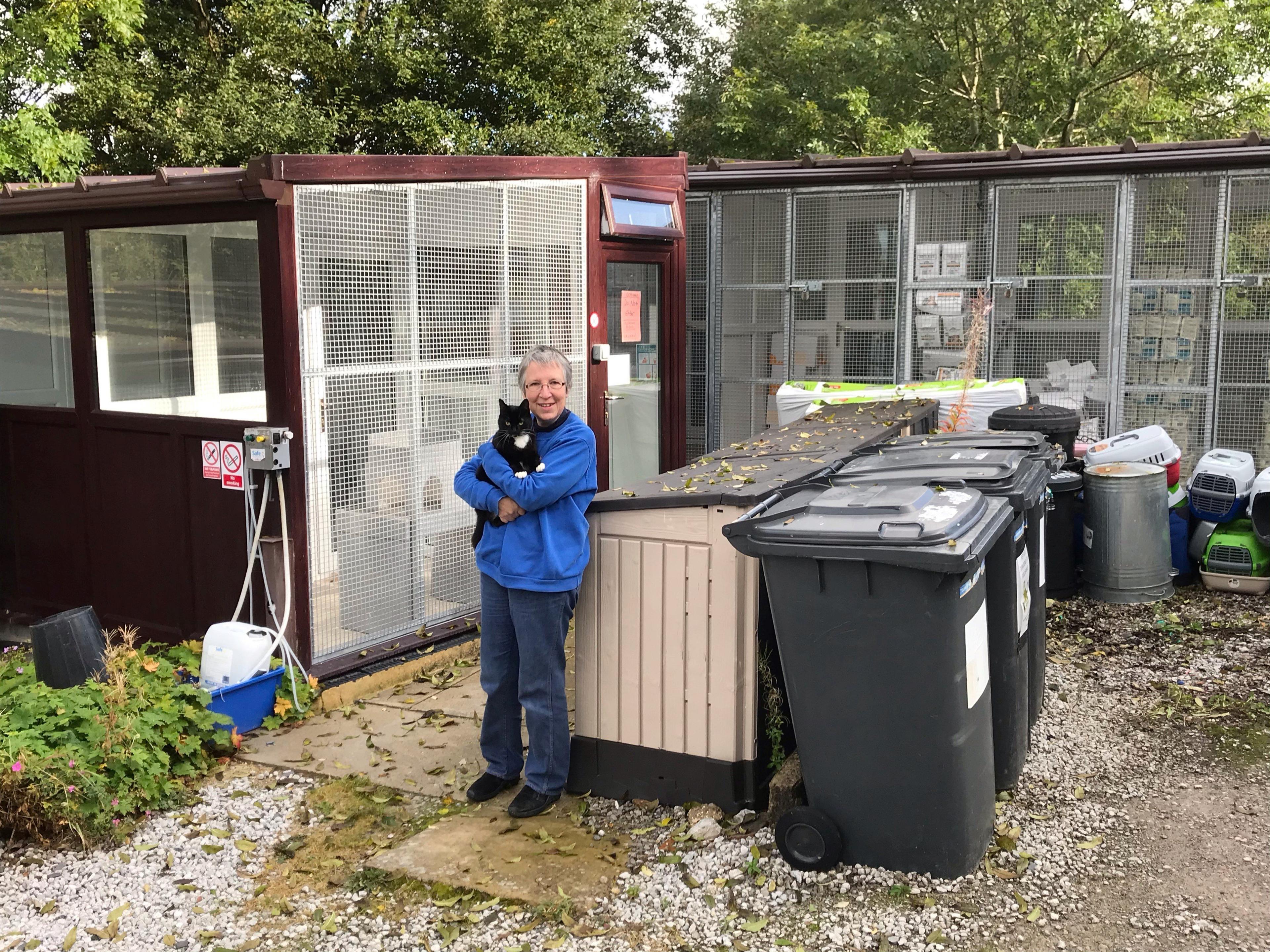
Yorkshire Cat Rescue's Sara Atkinson has cancelled its fundraising activities
Yorkshire Cat Rescue takes in about 800 animals a year at its sanctuary in Keighley, North Yorkshire.
But with its 10 staff still having to work from home and the centre unable to reopen safely, the 130 cats currently in its care are being looked after by dozens of foster carers spread around the county.
It has had to cancel its usual fundraising activities including an abseil and a charity ball. Its four charity shops are shut again following the start of the month-long national lockdown.
"In the early days of lockdown we did quite well, we made some money," said Mrs Atkinson.
More by the Shared Data Unit:
"But we were making hundreds rather than thousands.
"We used to make around £10,000 a month.
"If we have a successful virtual quiz, that's great - but it might be at the expense of a charity ball that raises £8,000.
"It's put us back a decade."
Mrs Atkinson said there were dedicated grants available for animal charities, but she said they were "massively oversubscribed".
Many foundations were prioritising giving funds to causes that were "directly Covid related", she said.
"They maybe don't realise that we are taking cats from people that are ill, people that have lost relatives or that have lost jobs.
"We are running around picking up the pieces of people's lives."
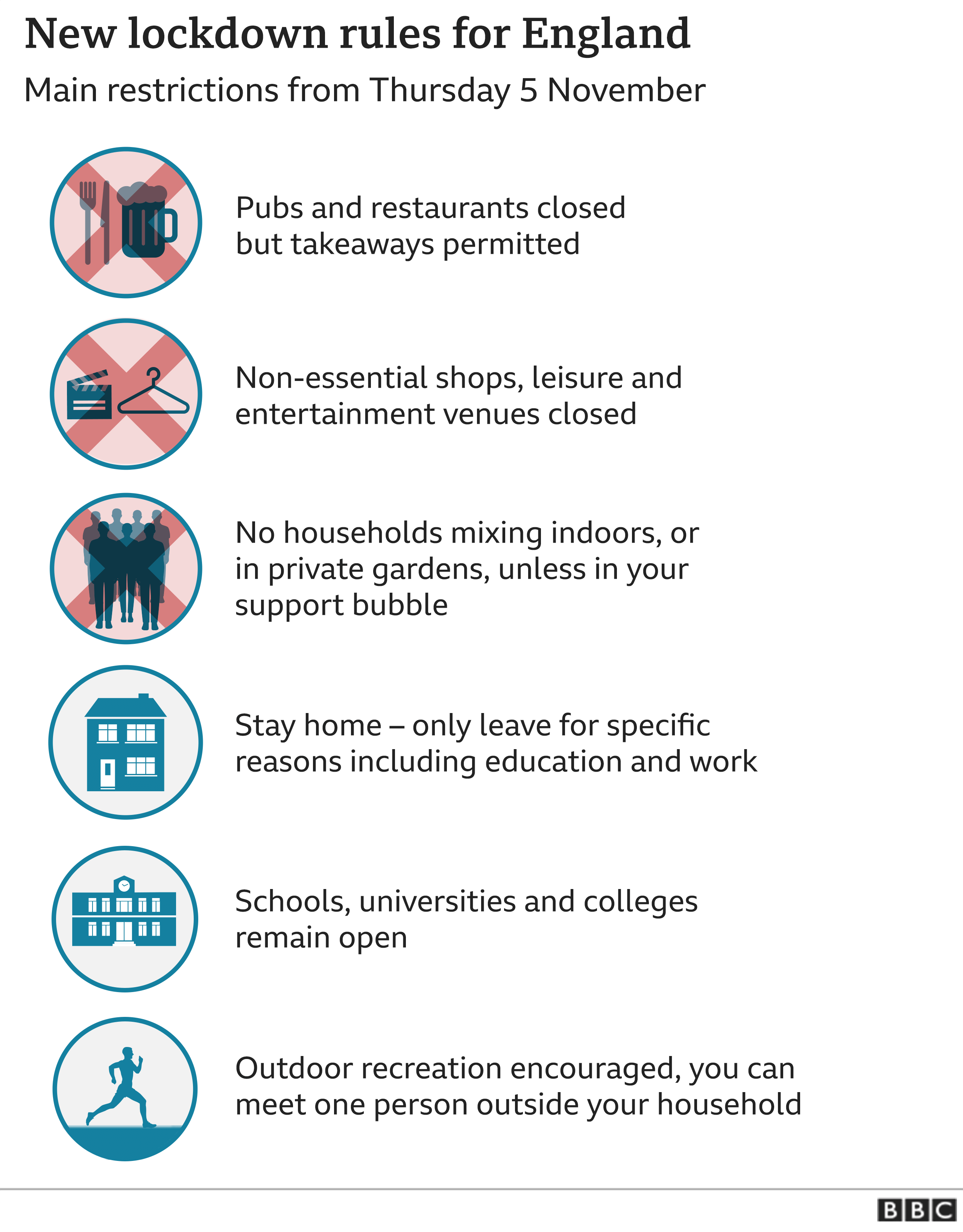
Is there any support available?
In April, the government released a £750m support package for the not-for-profit sector.
But a recent poll by the Small Charities Coalition, external (SCC) found only 50% of its member organisations had been successful in applying.
Many of the grants awarded aim to cover six months of operational costs, according to the SCC's chief executive, Rita Chadha.
As many organisations are staffed entirely by volunteers or trustees, they have not been eligible for the government's job retention scheme either.
Mrs Chadha says the true scale of impact to the sector will not be felt until early in 2021 when the funding runs out.
"It's a slow death," she said.
"Many of our charities are already having to decrease their operations already. They are telling us they are having to turn people away when demand for them is increasing.
"A domestic abuse charity I spoke to was having two referrals a day. They're now having 20."
The same poll found that, while 70% had experienced a drop in income as a result of the pandemic, 68% had experienced an increase in demand.
The Can Mezzanine offices in central London would usually be home to around 120 charities.
But chief executive Clive Dove-Dixon, said around a fifth have had to cancel their lease in order to save funds and scale back their operations.
Some are doing so on a temporary basis.
But Mr Dove-Dixon said: "I think there will be a large number of charities that won't have the financial resilience to weather this."
The CAF and SCC are among those backing a "five-point plan" which was sent to the Treasury in July.
The plan includes a plea to increase Gift Aid to 33% for two years, to repurpose the job retention scheme and to make a specific fund aimed at supporting charities in deprived areas.

More about this story
The Shared Data Unit makes data journalism available to news organisations across the media industry, as part of a partnership between the BBC and the News Media Association.
For more information on methodology, click here., external For the full dataset, click here., external Read more about the Local News Partnerships here.
- Published5 November 2020
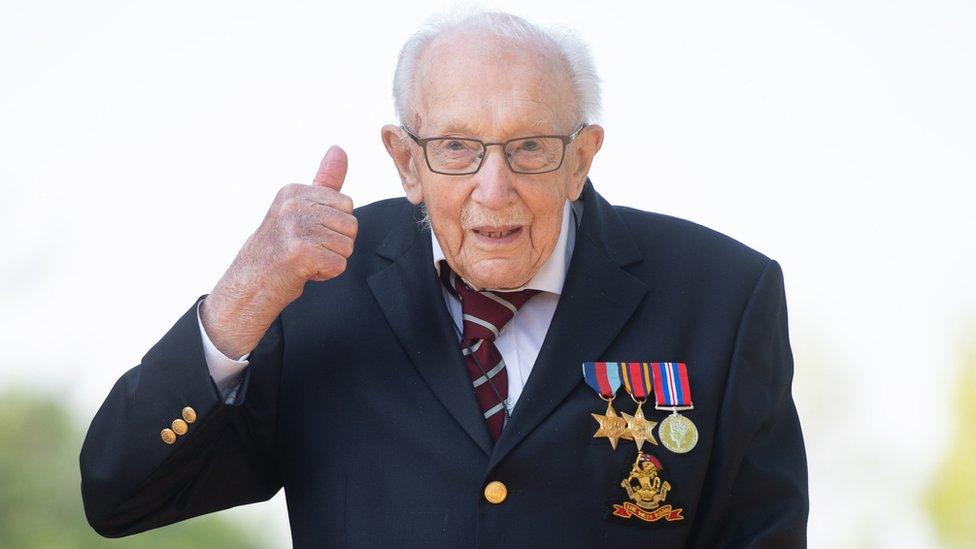
- Published4 November 2020
